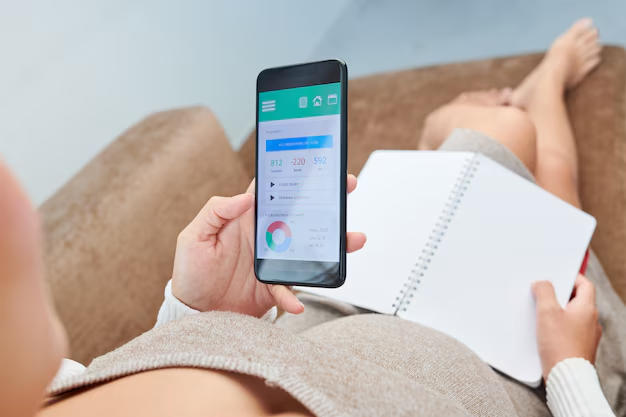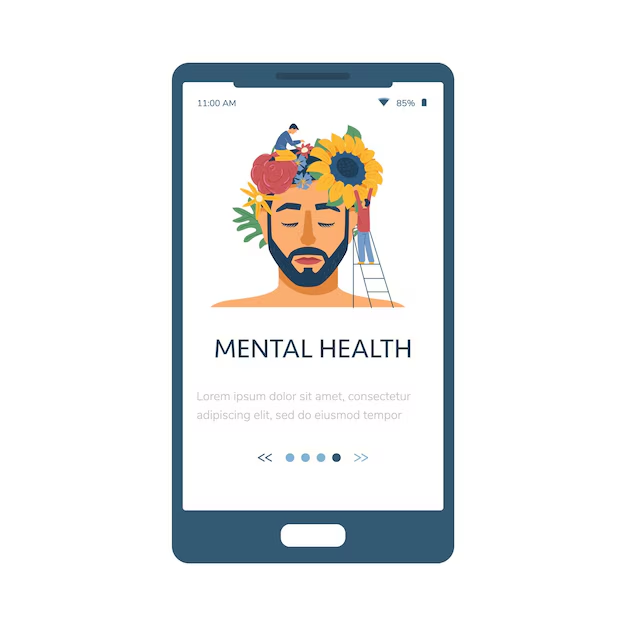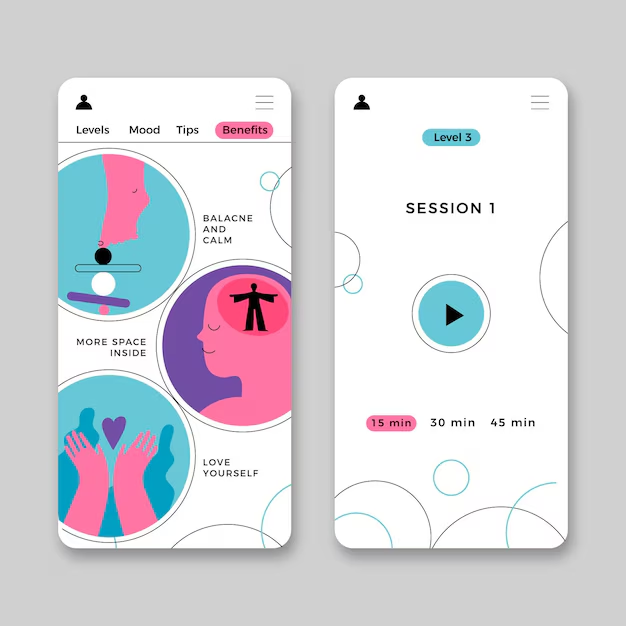Table of Contents

Introduction
In the fast-paced digital era we live in today, mental health has become an indispensable aspect of our overall well-being. With the increasing prevalence of stress, anxiety, and various emotional challenges, it is no longer optional but essential to prioritize mental health. Traditional mental health resources such as therapy and support groups, while beneficial, may not always be within reach due to various factors such as cost, availability, and the stigma associated with seeking help.
Enter mental health apps—these digital companions are playing a pivotal role in providing tools and resources to assist individuals in navigating their mental health journey. Their accessibility, affordability, and confidentiality make them an attractive option for those who may not have access to traditional forms of mental health care. This blog post aims to delve into the evolution of mental health apps, their various types, key features, and the science behind them, as well as offer insights into how to maximize their benefits while being aware of their limitations. Additionally, we will look at the top mental health apps of 2024 and the future of mental health technology.
The Role of Technology in Mental Health Management
The integration of technology into the mental health sector has significantly altered the landscape of mental health care. With the advent of mobile applications, individuals can now access mental health support with just a tap on their smartphones. These digital tools have the potential to reach millions of people who may otherwise have remained unserved due to the barriers mentioned earlier.
Key Benefits of Mental Health Apps:
- Accessibility: Mental health apps provide users with 24/7 support, transcending geographical and temporal constraints. This is particularly beneficial for those living in remote areas or those with limited time due to work or family commitments.
- Affordability: Many mental health apps are available for free or at a fraction of the cost of traditional therapy sessions, making mental health care more economically viable for a broader audience.
- Personalization: These apps can be tailored to suit individual preferences and requirements, offering a range of services from meditation and mindfulness to cognitive behavioral therapy (CBT) and mood tracking.
- Privacy: The stigma surrounding mental health often deters people from seeking help. Apps offer a discreet way for users to explore mental health resources without fear of judgment.
However, it is important to address the challenges that accompany these advancements, such as concerns over data security and the potential for over-reliance on technology. Ensuring these issues are mitigated is crucial to the effective and responsible use of mental health apps.
Categories of Mental Health Apps
The market for mental health apps is vast and varied, catering to a spectrum of needs and preferences. Below, we explore the primary categories of mental health apps and provide examples of some popular ones.
A. Meditation and Mindfulness Apps
These applications are designed to reduce stress and promote mindfulness. They are excellent resources for individuals looking to improve their focus and emotional equilibrium.
- Headspace: A widely recognized app that offers guided meditations tailored to various aspects of life, such as stress, sleep, and productivity. It uses a simple, user-friendly interface to introduce users to the practice of mindfulness.
- Calm: This app combines relaxation techniques with sleep stories and music to create a serene environment conducive to rest and stress relief. It features a diverse library of content, including guided meditations, breathing exercises, and bedtime stories.
- Insight Timer: Boasting thousands of free meditations for users with different needs, Insight Timer is a versatile app that caters to both beginners and experienced practitioners. It also allows users to customize their meditation sessions and track their progress.
B. Therapy and Counseling Apps
These apps connect users with licensed therapists, offering a more accessible alternative to traditional in-office therapy sessions.
- BetterHelp: A leading online counseling platform that matches users with therapists based on their preferences, including the therapist’s expertise, communication style, and appointment availability.
- Talkspace: This app provides users with a range of therapy options, from text-based communication to audio and video sessions, offering flexibility in how they receive their treatment.
- ReGain: Specializing in couples therapy, ReGain enables users to work through relationship challenges with the guidance of licensed marriage and family therapists.
C. Mood Tracking and Journaling Apps
Mood tracking and journaling are instrumental in understanding one’s emotional patterns and identifying potential triggers. These apps offer a safe space for users to express their thoughts and feelings.
- Daylio: A mood tracker and micro-journal in one, Daylio allows users to log their emotions and daily activities, providing insights into their mental health over time.
- Moodpath: This app not only tracks mood but also assesses mental health and delivers CBT-based activities to assist users in improving their mood.
- MoodKit: MoodKit provides users with practical advice and strategies to enhance their emotional well-being, offering tools to manage stress, anxiety, and depression.
D. Cognitive Behavioral Therapy (CBT) Apps
Apps that incorporate CBT principles aim to help users modify negative thought patterns and behaviors.
- Sanvello: Sanvello combines CBT tools with mindfulness and mood tracking to provide a holistic mental health management experience.
- Woebot: Utilizing artificial intelligence (AI), Woebot provides real-time CBT guidance, offering immediate support for those in need.
- MindShift: Specifically targeting anxiety management, MindShift employs CBT strategies to help users cope with stress and develop a more positive outlook.
E. Sleep-Focused Apps
Given the intricate relationship between sleep and mental health, these apps are designed to help users improve their sleep quality and patterns.
- Sleep Cycle: By analyzing sleep patterns, Sleep Cycle can wake users at the optimal time in their sleep cycle, reducing grogginess and enhancing overall well-being.
- Pillow: A comprehensive sleep-tracking app that monitors sleep stages and provides insights into sleep quality, offering personalized advice for better sleep hygiene.
- Relax Melodies: With its library of calming sounds and white noise, Relax Melodies helps users create a soothing environment conducive to restful sleep.
F. Support and Community Apps
These apps foster connections among users, providing a sense of belonging and support.
- 7 Cups: This platform offers peer support and access to professional listeners for users in need of emotional support.
- Wisdo: Wisdo connects users based on shared experiences and goals, offering a space to learn from and encourage one another.
- Shine: Shine combines community support with self-care content, delivering daily motivational messages and guided meditations to its users.

Features to Look for in a Mental Health App
When selecting a mental health app, consider the following critical features:
- Ease of Use: A straightforward and intuitive interface is essential for a seamless user experience.
- Scientific Backing: Ensure the app is developed with the input of mental health professionals and is grounded in evidence-based practices.
- Customization: The app should be able to adapt to your unique needs and offer personalized recommendations.
- Privacy Policies: Data security is paramount, so choose an app that prioritizes user privacy and has clear data handling practices.
- Professional Integration: Some apps allow users to connect with licensed therapists, which can be incredibly beneficial for those seeking professional guidance.
Top Mental Health Apps of 2024: In-Depth Reviews
In this section, we will explore the most popular mental health apps of 2024, offering detailed analyses of their features, user experiences, and costs. This will provide a solid foundation for readers to make informed decisions about which apps may best serve their mental health needs.
The Science Behind Mental Health Apps
Mental health apps often draw from established psychological frameworks such as:
- Cognitive Behavioral Therapy (CBT): This approach helps users become aware of and modify negative thought patterns that contribute to their mental health challenges.
- Mindfulness-Based Stress Reduction (MBSR): By cultivating mindfulness, these apps encourage users to live in the present moment, thereby reducing stress and anxiety.
- Biofeedback: Some apps utilize biofeedback techniques to help users understand their physiological responses to stress, enabling them to develop better coping strategies.
Research indicates that consistent use of mental health apps can lead to significant improvements in mental health outcomes. However, they are not a substitute for professional help, especially in severe cases.

Benefits of Using Mental Health Apps
- Overcoming Barriers: Mental health apps reduce the barriers to care by offering cost-effective and accessible resources.
- Building Self-Awareness: Regularly tracking moods and engaging in reflective practices can lead to a deeper understanding of one’s emotional triggers.
- Encouraging Proactive Care: By providing users with tools to manage their mental health daily, these apps empower individuals to take small, consistent steps toward better mental well-being.
Tips for Maximizing the Use of Mental Health Apps
- Choose Wisely: Select an app that aligns with your specific needs, whether it be anxiety management, sleep enhancement, or general mental health maintenance.
- Establish a Routine: Incorporate the app into your daily routine for optimal effectiveness.
- Combine with Professional Help: Use mental health apps as a complement to, rather than a replacement for, therapy or counseling sessions.
Potential Challenges and Limitations
While mental health apps have much to offer, they are not without limitations:
- Lack of Personalization: While apps can be tailored to a certain extent, they cannot fully replicate the nuanced understanding that a human therapist brings to the table.
- Engagement Challenges: Users may struggle with motivation and consistency over time.
- Data Security Risks: Ensure that you review an app’s privacy policy thoroughly before entrusting it with sensitive information.
The Future of Mental Health Apps
The mental health app industry is evolving rapidly, with new technologies and features continually being introduced.
- AI and Machine Learning: Apps like Woebot showcase how AI can provide instant support, adapting to individual user needs.
- Virtual Reality (VR): VR technology holds promise in offering immersive therapeutic experiences for conditions such as post-traumatic stress disorder (PTSD).
- Global Accessibility: The potential for mental health apps to reach underserved populations and expand mental health resources worldwide is immense.

Conclusion
Mental health apps have become an integral part of the modern mental health toolkit, offering a myriad of resources to manage stress, anxiety, sleep issues, and more. While they are not a cure-all, their accessibility and effectiveness make them a valuable addition to one’s self-care regimen. By integrating these digital tools into daily life, individuals can take proactive steps toward achieving a more balanced and healthier mental state. As technology advances, the potential for mental health apps to transform lives and democratize mental health care is boundless. However, it is essential to use them responsibly and in conjunction with professional care when necessary.